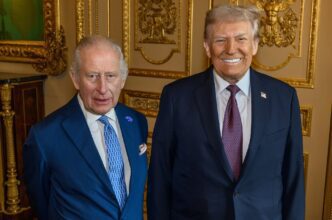Executive Summary
The Story So Far
Why This Matters
Who Thinks What?
During a recent state visit, King Charles III subtly underscored the critical need for continued U.S. involvement in deterring Russia’s war in Ukraine, a message directed at President Trump amidst his perceived hesitancy on further sanctions and apparent displeasure with Ukraine’s leadership. The monarch’s remarks, made during a state banquet, highlighted Britain’s ongoing efforts to leverage its soft power to persuade Trump to intensify pressure on Moscow.
Diplomatic Overtures
King Charles’s fleeting mention of Ukraine, which stood out in a speech otherwise devoid of geopolitics, is widely seen as a carefully crafted diplomatic move. These remarks, likely developed with input from the British government, signal a clear commitment to supporting Ukraine, following the UK’s hosting of President Zelensky in March.
The unfolding situation in Ukraine is serving as a significant test of Britain’s capacity to influence President Trump’s foreign policy approach. Many European officials are hopeful that this diplomatic charm offensive will re-instill in Trump an appreciation for the U.S.’s pivotal role in European security and inspire renewed action against Russia.
Upcoming Discussions and Trump’s Stance
The issue of Ukraine is anticipated to be a central topic during President Trump’s upcoming meeting with Prime Minister Starmer at Chequers. Starmer is expected to advocate for a tougher stance on Moscow, with discussions potentially drawing on Churchill’s archive as a historical reminder of enduring U.S. involvement in European affairs.
President Trump has previously voiced frustration with Ukrainian President Zelensky, suggesting a need for a negotiated settlement to end the conflict. He has also criticized European nations for their continued reliance on Russian oil imports, placing blame for further action squarely on their shoulders.
International Divides
While Trump has imposed new tariffs on India, his administration has refrained from similar actions against China, and his intentions regarding discussions on Ukraine with leaders like Modi and Xi remain unclear. This stance complicates efforts, as European leaders have shown little enthusiasm for agreeing to additional tariffs on China and India.
Further diminishing optimism among European officials is the continued reliance on Russian oil and gas by several countries, including Hungary. This internal division within Europe presents an additional hurdle to forging a unified front and securing new, decisive actions from President Trump.
Outlook on Ukraine Policy
The state visit has underscored the complex diplomatic dance underway as the UK and its European allies seek to align President Trump’s approach to the conflict in Ukraine. Despite ongoing challenges and differing perspectives on sanctions and energy policy, efforts persist to reinforce the importance of a strong, united front against Russian aggression.








